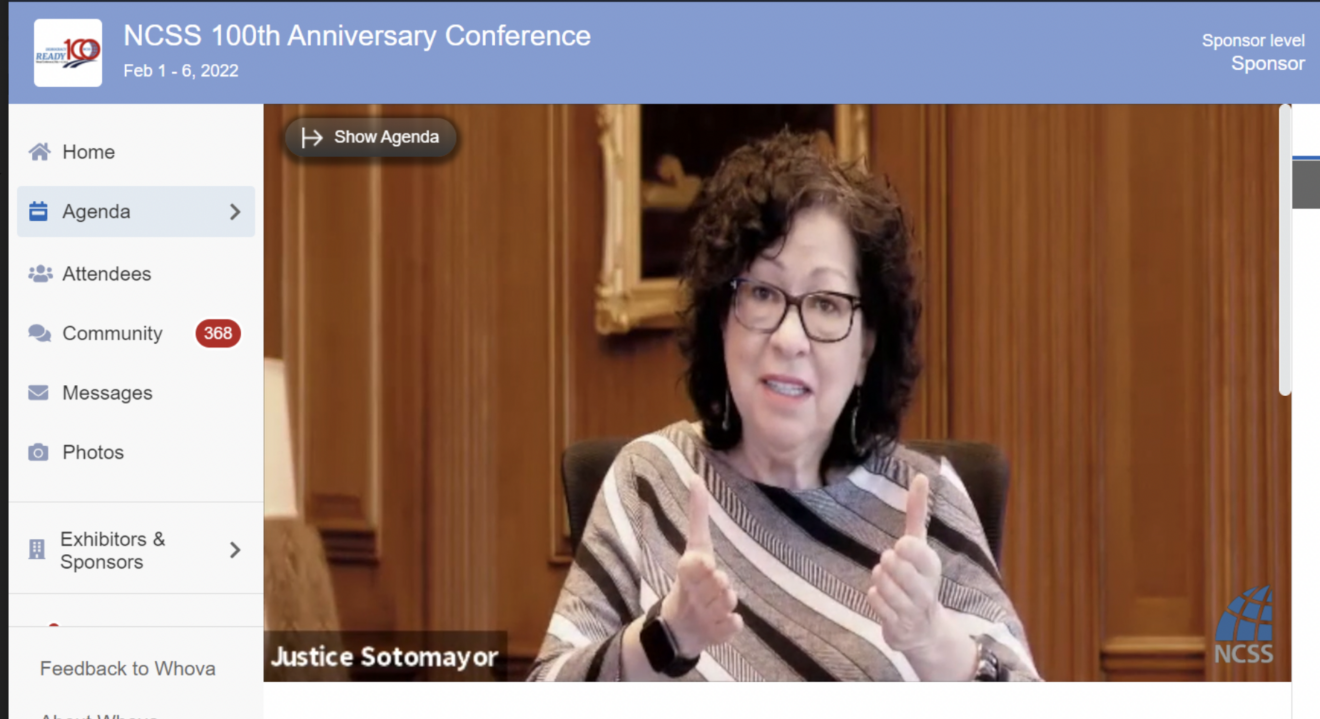Civic engagement can be done by anyone regardless of age, says US Supreme Court Associate Justice Sonia Sotomayor during an appearance at the 100th Anniversary Conference of the National Council for the Social Studies.
Speaking in the closing keynote videoconference of the event, Sotomayor spent about an hour answering questions posed by teachers from across the US. Questions touched on her advice for future generations, suggestions for getting students involved in civics and ideas for students to prepare to become empowered and engaged citizens.
Sotomayor mentioned more than once that students need to realize what happens when they choose the role of bystanders in life — that they are ceding control of their lives to other people.
“If you don’t participate actively, you’re going to be a bystander,” she said. “You’re going to let life step on you. You’re going to let others control the quality of your life,” said Sotomayor, who was nominated in 2009 to the Supreme Court by President Barack Obama.
Students have more power than they realize
“Students don’t know they have a constitutional right to petition for redress,” Sotomayor said. “So many students don’t know how to go about it. Talk to students about their power.”
Most students in K-12 schools are too young to vote, but casting a ballot is far from the only power available. She mentioned letter-writing campaigns, working for political candidates and even just asking the adults in their lives about whether they have voted.
It wasn’t until Sotomayor was attending Princeton University as an undergraduate that she experienced the power of helping others. After reading about the plight of a man held in a psychiatric hospital for weeks because of a lack of Spanish speakers who could contact his family to help him, Sotomayor led an effort to have Spanish-speaking students volunteer to help such patients at the hospital.
“It made me feel, for the very first time, in my life that I was useful,” the justice said. “I wasn’t doing something just for me. And not just for another person, but for my community. I realized that that feeling was wonderful.”
Civic participation is a lifelong pursuit
A 1979 graduate of Yale Law School, Sotomayor went on to work as an attorney while serving on various boards and committees in her home state of New York. She continues her community involvement while serving on the highest court in the land. She is a board member of iCivics, a civics education organization founded in 2009 by retired Supreme Court Justice Sandra Day O’Connor, and participates in the discussions like the one for NCSS.
Sotomayor cautioned conference participants to make students aware that some efforts will fail, but sometimes it is enough to “sensitize people to an issue,” getting them thinking about it and leading to a chance of change at a later time. This requires accepting some limitations and the possibility of failure as well as understanding the benefits of trying.
Asked by a teacher in Washington state about the role of the courts in democracy, Sotomayor said judges lead by “example and deed” inside and outside the courtroom, so they are obligated to engage in civic education to help ensure the public understands the strengths and limits of the judiciary, how it operates and its role in society.
“That’s what civics education should be doing,” she said.
The youngest students can be civic-minded too
While most of the session’s questions focused on older students, Sotomayor shared that her second children’s book, Just Help! How to Build a Better World, offers examples of how even the youngest students can make a difference in big and little ways – even by just making room to allow a friend to squeeze into a seat on the bus.
Sotomayor praised teachers for “doing God’s work. God creates our children. You are the ones who help them grow. And so thank you for your work and thank you for your commitment to protecting democracy and for inspiring kids to go out there and change the world.”
Trigie Ealey is an education editor at SmartBrief.
________________________________
If you liked this article, sign up for SmartBrief’s free email newsletter from ASCD. It’s among SmartBrief’s more than 250 industry-focused newsletters.
More from SmartBrief Education:
- 5 ways new school-home communication meets family, staff needs
- 5 virtual-classroom tools to foster authentic connections
- Changing the classroom experience with instructional audio
- Powerful social media solutions for students
- How comics curriculum boosts SEL
- 8 ways to make vocabulary instruction more effective
